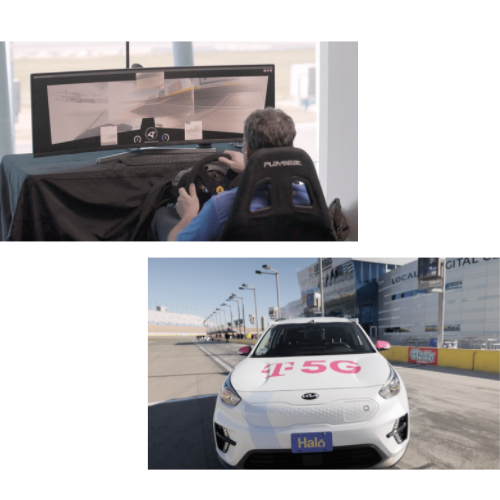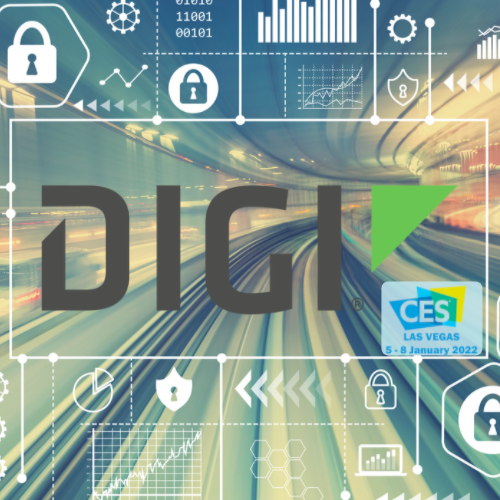
At the CES event this month, Halo’s autonomous cars along with help through their partnership with T-Mobile 5G, seriously burned rubber with their racecar showdown. Halo got its start early on in the driverless and autonomous car field and has quickly become a leader. This was partly with the help of T-Mobile as they are a graduate of the 5G Open Innovation Lab, which was co-founded by T-Mobile.
The Halo car wasn’t exactly racing itself, but it instead acted as a pace car for drivers in the Indy Autonomous Challenge (IAC). It ran fully off of T-Mobile’s Ultra Capacity 5G network. The car drove multiple laps, reaching speeds up to 95 mph.
This 5G network runs on the mid-band 5G frequency, 2.5GHz – not to be confused with the mid-band, or C-Band that AT&T and Verizon have opted for. This has put them way behind T-mobile in terms of 5G coverage. Currently, T-Mobile’s mid-band frequency covers 200 million users, but they are now aiming for 300 million. In comparison, Verizon just reached 100 million users, while AT&T is only sitting with around 70 million.
The IAC was held at the Las Vegas Motor Speedway. This is where Halo is already operating its service on the 5G network. T-Mobile’s 5G network supported real-time commands and a live video stream. This video stream connected the pilot, who remotely navigated the vehicle around the track from a nearby building, to the Halo car. You can see a video clip of the event here.
Over this past summer, tests were conducted for consumer riders much like Uber or Lyft, but driverless. Of course there is a big difference! Once the customer orders the vehicle, it will drive itself to the rider. When the car arrives, the rider will have to manually drive the vehicle where needed. After their ride is complete, the vehicle then drives itself back to the Halo garage.
In order for this to work the car is installed with multiple 5G modems that communicate with the 5G network, as well as several in-car cameras. Halo uses a proprietary RemotePilot technology, which they train drivers on in-house. They’ve also developed an Advanced Safe Stop mechanism. This enables its cars to immediately come to a full stop if a potential safety hazard or system anomaly is detected.
Halo cars even use an advanced Artificial Intelligence algorithm, so they’re always learning in the background. It does this when the human is manually driving the car, as well as on its own. This builds a unique feedback loop to assist them in achieving Level 3 capabilities, over time. What this refers to are the 6 levels of Artificial Intelligence.
“Full autonomy is a massive challenge from both a technical and social trust perspective that won’t be solved for years to come,” said Anand Nandakumar, the founder and CEO of Halo. “But Halo has been designed to address these challenges by building automation over time starting with a solution that consumers will feel comfortable using today.”
You can imagine how much work went into the project so it’s no surprise that T-Mobile is not the only partner behind Halo. Per the T-Mobile announcement, Halo was founded by executives from Uber, Cruise Robotics, Proterra, Amazon, and more. “Halo is poised to serve a global $2.5 trillion-dollar transportation market creating local jobs with an innovative, on-demand car-sharing model.”
These are exciting times for T-Mobile 5G and 5G in general, not to mention the car world and the possibilities with Artificial Intelligence.
“Driverless cars! Fueling this kind of startup innovation is part of why we’ve built the biggest, fastest and most reliable 5G network in the country,” said Mike Sievert, CEO of T-Mobile. “Innovation and driving change for the better is our DNA at the Un-carrier, and we’ve unleashed a 5G network that will transform industries and change our world for the better. I can’t wait to see what comes next as we work with startups, developers and entrepreneurs like Halo building the next big thing in 5G!”
For more information on autonomous race cars, be sure to check out the Indy Autonomous Challenge (IAC), at their website here. This was first ever race between 5 autonomous race car teams. The winner was team PoliMOVE from Politecnico di Milano (Italy) and the University of Alabama. The rules of the IAC competition required each team to qualify in a high-speed autonomous racecar time trial competition determining their seed in the head-to-head passing competition. The winning team also reached a record breaking top speed of 173 mph.
“Today was the real birth of autonomous racing,” said Prof. Sergio Savaresi, team lead of Politecnico di Milano. “The real high-speed multi-agent racing was pushed to its very limits. The research on autonomous cars will certainly benefit from this historic milestone.”



